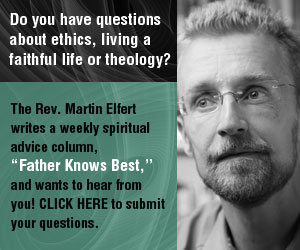Do you have a question about life, love, or faith? Submit it online, fill out the form below or email it [email protected].
Hey Rev!
I have been practicing science for a very long time and over the years have become an incorrigible atheist. I simply cannot let go of my deep-seated need for evidence, and to employ the best logic and reasoning skills I can muster, regardless of the circumstance. Certainly, I understand that I do not, or cannot, know or understand everything but that never keeps me from trying. Do you think I could ever regain faith and, if so, how?
– Anton
Dear Anton:
Yes, you can regain faith. How? Well, the same way that you learn to do pretty much everything else:
Practice.
Ten-odd years ago, when I was first wondering about coming to church, I worried that I didn’t have what it took to be a Christian. Yes, there was an insistent tug on my heart, an invitation into something bigger than myself that wouldn’t go away, and I sensed that I could best respond to that holy whisper within the context of a worshiping community. But there was also a lot about church that I didn’t understand, a lot that strained the limits of my credulity. I was (and I remain) a person who puts a big premium on critical thinking, a person who, a lot like you, values evidence and reason and logic. Looking at a lot of Scripture, looking at a lot of the creeds, I said something that maybe you will recognize:
“I don’t know if I can believe that.”
I didn’t understand that not knowing was enough to begin.
My doubts and my anxieties notwithstanding, I started going to church. I often didn’t sing during the hymns, didn’t receive communion, remained silent during the Lord’s Prayer, my hands hanging at my sides, awkward. But just being there began to change something for me. Michael Ramsey, writing more than 40 years ago, describes my experience almost as though he were narrating from inside my head:
…put yourself with God, empty perhaps, but hungry and thirsty for him; and if in sincerity you cannot say that you want God you can perhaps tell God that you want to want him; and if you cannot say even that perhaps you can say that you want to want to want him! Thus you can be very near him in your naked sincerity; and he will do the rest, drawing out from you longings deeper than you knew were there and pouring into you a trust and a love…
What Ramsey describes, and what I was discovering in those days, is what the artists and the mystics have known for generations and what neurological research is now confirming: our practices change us. They open us up to possibility. Through my new practice of showing up at church —through the opportunities for study, for conversation, for questioning, for service, for worship, and so on which church afforded me — I began to understand and to love church’s symbols and rhythms and, yes, even its beliefs. And I began to understand and to love that dense and contradictory and beautiful and transformative book which we call the Bible.
Thomas Lewis, Fari Amini, and Richard Lannon, writing in “A General Theory of Love,” describe such a change in a person like this: the more often that you think or do or imagine a given thing, “the more probable it is your mind will revisit its prior neuronal stopping point.” To put that thought still another way, a practice such as going to church helps us to notice the Divine.
So, Anton, if you are wondering about returning to faith, get practicing. Find a worshiping community that values reason as much as you do, that doesn’t see science and religion as being in any way in argument with one another. (While such communities tend to have trouble getting press, there are lots of us out there.) And then go. Go and be as open and as generously curious as you are able. Go and hold things as lightly as you are able. Go and remember that, sooner or later, every one of us believes in things that he or she can’t prove: we can’t prove that music is beautiful; we can’t prove that empirical evidence is the one and only reliable way of finding the truth; we can’t prove that another human being loves us or that we love him or her.
Take the risk which is beginning a practice. Stop standing at the edge of the dance floor, wondering if it’s logical and reasonable for you to go talk to the one who catches your eye. Just go and talk to him or her. Maybe it won’t work out. But maybe it will.
Maybe you will be surprised to learn that, as clumsy and as alien as the dance which is church may feel at first, it is a practice that makes it just a little easier to pay attention to the big love that we call God.






